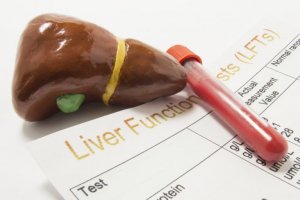5 Causes of Elevated Alkaline Phosphatase


Written and verified by the doctor Grecia Morillo
Alkaline phosphatase is an enzyme found in our body. It’s found especially in the liver and bone tissue.
In this article, we’ll explain the 5 causes of elevated alkaline phosphatase in detail. We’ll be able to discover certain diseases that are related to this imbalance.
Alkaline phosphatase
Alkaline phosphatase is an enzyme found in most tissues of the body. However, it’s predominant in the liver, bile ducts, and bone tissue.
In addition, it’s distributed in various forms. All of these can be quantified separately if required by a blood test. Normal values are described in the range of 30 to 140 IU/L.
What is the alkaline phosphatase test?
The test is performed routinely or in the presence of certain symptoms such as nausea, vomiting, weakness, fatigue, weight loss, and jaundice. Also, pruritus, abdominal pain and distension, and dark colored urine or light colored stools.
In the case of bone symptoms, joint pain, elongated or deformed bones, or frequent fractures could be observed.
The procedure’s very simple. It consists of minimal blood sampling for analysis and doesn’t require fasting unless the physician has ordered other tests. Elevated alkaline phosphatase levels may indicate liver or bone disease.
5 causes that increase the alkaline phosphatase level
Among those that can alter this enzyme above normal levels are fracture recovery, vitamin D deficiency, or alcoholism. Here are the causes that can elevate it.
1. Liver diseases

Alkaline phosphatase values can be altered and elevated as a consequence of different liver diseases, according to this study by Dr. J. Sánchez Rodríguez. This is the case, for example, of viral hepatitis, in which not only transaminases increases, but also this enzyme. This is due to inflammation of the organ and overproduction of bilirubin.
Similarly, it often occurs in other acute diseases, such as bile duct obstruction in cholecystitis as well as in chronic diseases such as liver cirrhosis or in the consequences of liver cancer.
We also recommend you also read: What Are Toxins and How Do They Act in Your Body?
2. Bone diseases
One of the bone diseases that points to the elevation of alkaline phosphatase is Paget’s disease, according to this study from Washington University in St. Louis (Missouri). In this disease, the bones are characterized by progressive deformation and widening. However, when the disease is controlled, the levels become regular again.
This enzyme is also increased in certain types of cancers that metastasize or invade the bone. As in the previous case, with timely and effective treatment, the values can return to their normal range.
3. Tumors

One of the tumors or neoplastic processes that has an impact on the elevation of alkaline phosphatase is Hodgkin’s lymphoma. This is a characteristic tumor of the lymph nodes that increases the levels of this enzyme.
As part of the involvement of lymphoma, there’s an imbalance in liver function. This results in altered alkaline phosphatase values.
However, this is a laboratory finding that begins to be noted in the advanced stages of the disease. Therefore, it implies that it’s a sign of severity when in severe stages of this condition.
Other tumors that are alkaline phosphatase producers are cancers of the:
- Lungs
- Ovaries
- Prostate
- Pharynx
- Testicles
- And also leukemias, which has an origin similar to that of lymphoma
4. Pregnancy
From the third trimester onwards, the placenta in the mother is a producer of the enzyme alkaline phosphatase. This influences the overall maternal values and increases them above the normal range, even up to 140 to 250 IU/L.
We invite you to continue reading: 5 Warning Signs of Fatty Liver Disease
However, as it’s a physiological condition, this increase in the enzyme is no cause for alarm if it’s treated from the beginning, as it usually disappears after childbirth, according to this research carried out by the Ramón y Cajal University Hospital (Madrid). In this case, it’s a substance required for the synthesis of proteins and the calcification of bones and cartilage in the fetus.
The problem would be if, after birth, the levels of the enzyme persist in these elevated ranges. Then it would be necessary to look for another cause.
5. Specific medications

Many of the drugs that are prescribed, even for everyday illnesses, have the characteristic of raising the visible alkaline phosphatase enzyme. Among the drugs that frequently have this effect as part of their action are:
- Antacids such as ranitidine
- Antiepileptics and anticonvulsants such as phenytoin and carbamazepine
- Macrolide antibiotics such as erythromycin
- Antihypertensive calcium channel blockers, such as verapamil
Therefore, when visiting the doctor, each patient should inform the professional about the drugs they take. This way, it’s possible to foresee the increase of alkaline phosphatase and not worry about possible diseases that may be increasing such values. This is achieved with an adequate clinical history and a good relationship between the physician and the patient.
All cited sources were thoroughly reviewed by our team to ensure their quality, reliability, currency, and validity. The bibliography of this article was considered reliable and of academic or scientific accuracy.
- García Ferrera, W. (2013). ¿Cómo evaluar la elevación de las enzimas hepáticas en personas aparentemente sanas?: Su importancia para el médico general. Revista de Gastroenterología del Perú, 33(3), 262-264. http://www.scielo.org.pe/scielo.php?script=sci_arttext&pid=S1022-51292013000300011#:~:text=La%20fosfatasa%20alcalina%20(FA)%20proviene,de%20fosfatasa%20alcalina%20en%20suero.
- Busto Bea, V., & Herrero Quirós, C. (2015). Pruebas de función hepática: B, AST, ALT, FA y GGT. Revista Española de Enfermedades Digestivas, 107(10), 648. https://scielo.isciii.es/scielo.php?script=sci_arttext&pid=S1130-01082015001000017
- Caicedo, A. L., Escobar, V., Urrea, V. A. C., Charry, J. S. S., & Loaiza, J. (2020). Enfermedad de Paget de hueso esporádica. Serie de casos y revisión de la literatura. Revista Colombiana de Reumatología, 27(2), 103-111. http://www.scielo.org.co/scielo.php?script=sci_arttext&pid=S0121-81232020000200103
- Aular-García, J., Reyna-Villasmil, E., Mejia-Montilla, J., Santos-Bolívar, J., Torres-Cepeda, D., & Reyna-Villasmil, N. (2015). Fosfatasa alcalina placentaria para la predicción de parto pretérmino. Progresos de Obstetricia y Ginecología. https://www.elsevier.es/es-revista-progresos-obstetricia-ginecologia-151-avance-resumen-fosfatasa-alcalina-placentaria-prediccion-parto-S0304501315002320#:~:text=La%20fosfatasa%20alcalina%20placentaria%20(FAP,m%C3%A1ximas%20al%20t%C3%A9rmino%20del%20embarazo.
- Schonhaut, B. L., & Rocha, R. A. (2016). Hiperfosfatasemia transitoria benigna de la infancia, serie clinica. Revista chilena de pediatría. https://www.elsevier.es/es-revista-revista-chilena-pediatria-219-avance-hiperfosfatasemia-transitoria-benigna-infancia-serie-S0370410616300201
- Deficiencia de vitamina D. (2010). Artículos – IntraMed. Consultado el 19 de julio de 2023. https://www.intramed.net/contenidover.asp?contenidoid=63878
- Navarro Despaigne, D., Moro Álvarez, M. J., & Díaz Curiel, M.. (2007). Hiperfosfatasemia familiar: Reporte de un caso y consideraciones diagnósticas. Anales de Medicina Interna, 24(8), 387-389. https://scielo.isciii.es/scielo.php?script=sci_arttext&pid=S0212-71992007000800007
This text is provided for informational purposes only and does not replace consultation with a professional. If in doubt, consult your specialist.








